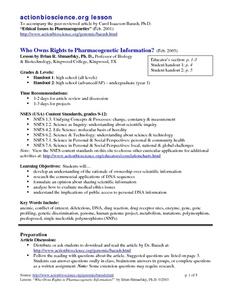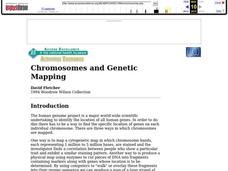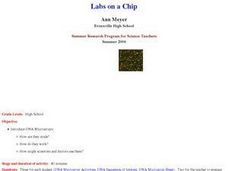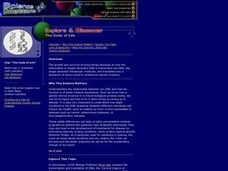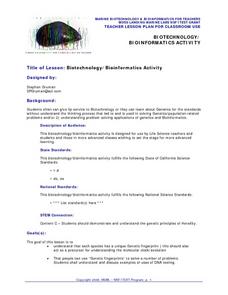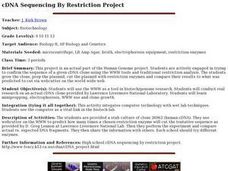Curated OER
Who Owns Rights to Pharmacogenetic Information?
Students develop an understanding of the rationale of ownership over scientific information. They research commercial applications of DNA sequences. They analyze how to evaluate medical ethics issues.
Curated OER
Cracking the Genetic Code
Students examine an article, "Genome 'Treasure Trove'" and participate in a class discussion prior to researching further information in order to write their own feature article on the Human Genome Project.
Curated OER
Controlling the Code: Molecules at Word
Young scholars investigate how cells determine which genes will be expressed and which will be silent. In this genetics lesson, students use on-line resources to complete a worksheet and gather information about gene regulation. Lesson...
Curated OER
Chromosomes and Genetic Mapping
Young scholars are introduced to mapping by crossover frequency. Genes travel as packaged trains on chromosomes. They use this experiment, genetic mapping assignment, that allow students to quickly complete the assignment and yet...
Curated OER
Genome: A Tour and Genetic Disorder Brochure
Learners use the Internet to gather information about genetics, then research a genetic disorder. In this biology lesson, students listen to an interview with a geneticist, watch an animation of "chromosome coiling", then research and...
Curated OER
Who Stole My Salad?
Eighth graders explain how protein is made in the cell. For this biology lesson, 8th graders translate RNA and DNA using an internet database. They determine the thief based on evidence collected.
Curated OER
Labs on A Chip
Young scholars are introduced to DNA microarrays. They discuss how scientists and doctors use them and how they work. They complete a worksheet and discuss their findings.
Curated OER
DNA Fingerprinting
Middle schoolers experiment with chromatography as a technique which is similar to electrophoresis that scientists use to identify DNA samples.
Curated OER
The Code of Life
Students study genes, DNA and medical research. They watch "The Code of Life" video and answer discussion questions regarding the transcription and translation of DNA and how errors in these processes and mutations in DNA can produce...
Curated OER
Biotechnology/Bioinformatics Activity
Students demonstrate the genetic principles of Heredity. They discover that each species has a unique Genetic fingerprint and that people can use "Genetic fingerprints" to solve a number of problems. They discuss examples of uses of DNA...
Curated OER
Visualizing a Human Gene with Its Introns & Exons
Students examine the entire DNA base sequence of the human adenosine deaminase gene after it is printed out from the source disk provided. The enormous length of a single gene as well as the immense difference in length between intron...
Curated OER
Protein Factory
Students examine protein synthesis and how DNA is transcribed. For this investigative lesson students play a role in the messenger RNA when it creates nucleotides.
Serendip
From Gene to Protein - Transcription and Translation
Learners identify the different steps involved in DNA transcription. In this genetics lesson, pupils complete a worksheet and model the translation process with a paper chain activity. They watch a video on sickle cell anemia and explain...
Curated OER
cDNA Sequencing By Restriction Project
Young scholars try to confirm the sequence of a given cDNA clone using the WWW tools and traditional restriction analysis. They grow the clone, prep the plasmid, cut the plasmid with restriction enzymes and compare their results to what...
Teach Engineering
Don't Be a Square
If Parseltongue is a genetic trait, what is the probability a wizard will inherit the ability to speak Parseltongue? Scholars investigate magical and biological genetics with Punnett squares.
Oklahoma State University
Hairy Heredity
Young scholars learn that heredity comes down to the flip of a coin with this cross-curricular math and science lesson. Using smiley faces as a model, learners toss coins to determine which dominant or recessive traits...
Curated OER
How Cells Reproduce
Students explain why cells reproduce and draw a diagram of each of the stages in mitosis. They put the stages of mitosis (interphase, prophase, metaphase, anaphase, telophase, and cytokinesis) in the correct sequence, from the beginning...
Curated OER
Protein Factory
Pupils discuss the steps of protein synthesis before acting out the process as a class. They are assigned specific roles and receive an instruction card and get materials listed in order to perform their role. Students switch roles and...
Curated OER
Protein Synthesis
In this science related worksheet, students study, locate and answer ten multiple choice questions dealing with protein synthesis.
Curated OER
Disproving the Proof
Students investigate the progression of discoveries that have led to the genetics knowledge that scientists currently have. They determine how genetic experiments disproved previous theories on inheritance.
Curated OER
Microarrays: Chipping Away at the Mysteries of Science and Medicine
Learners research microarrays on the internet in cooperative groups. Students write an essay describing the use of microarrays in environmental research and in medicine.
Curated OER
Building YOU from MOO
Students build protiens according to whether they are suppose to be a plant, a cow, or a person. They discover that all proteins are made from the same amino acids and it is just the order of these amino acids that change.
Curated OER
Building You From Moo
Students are given an envelope that turns each of them into either a field of grass, or a diary cow, or a famous person (only one type of organism per student). The object is to get the correct building blocks for proteins (amino acids)...
Curated OER
Why Do We Need Vitamin C in Our Diet?
Students compare/contrast the DNA sequence data of the rat GULO gene to the inactive human GULO gene. They translate and align the sequences, and propose a scenario to explain the occurrence of an inactive DNA sequence to that of an...
